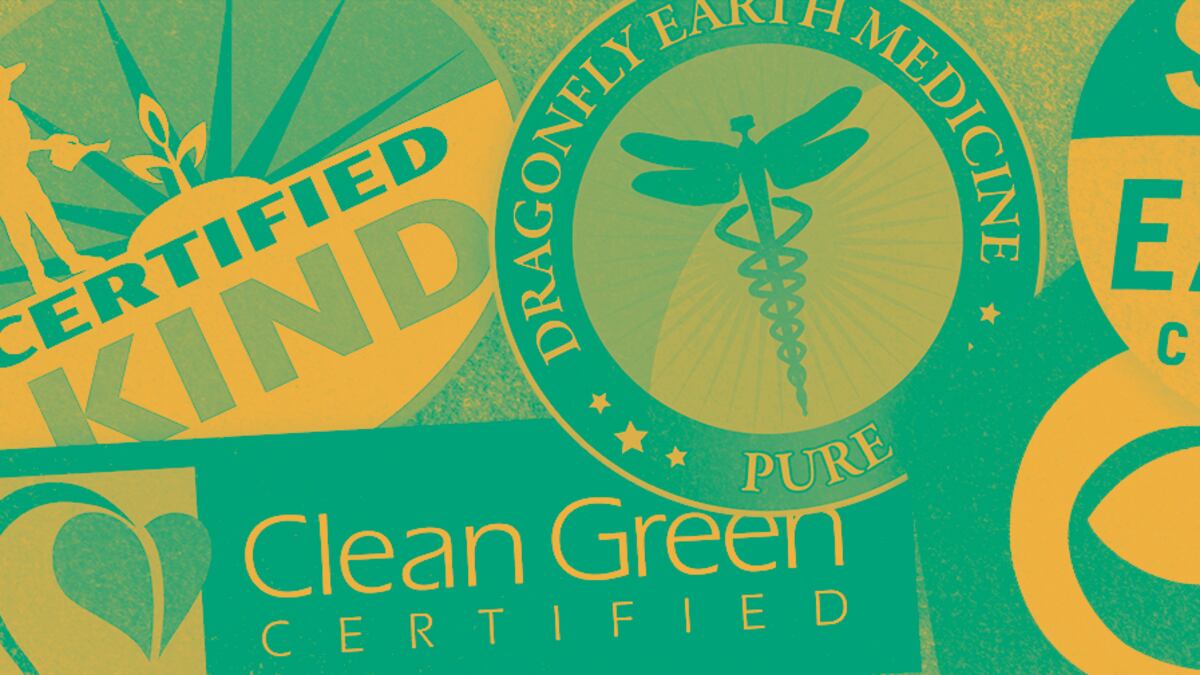Officially, there’s no such thing as “organic” cannabis.
It’s a matter of semantics, not substance—the national agency that tests and certifies organic produce, the U.S. Department of Agriculture, won’t touch a plant that’s still technically classified a Schedule I drug at the federal level.
That’s not to say there’s a lack of demand. A 2016 Consumer Reports study found that more than 1 in 3 marijuana users said they’d be willing to pay a premium for organic cannabis products. A 2019 report by TrendSource, a San Diego market research firm, put that figure at 53%.
In lieu of any sort of centralized certification agency, independent actors within the marijuana industry are taking matters into their own hands. One such company, Certified Kind, formed shortly after Oregon legalized recreational weed in 2014.
At the time, founder Andrew Black was working for a statewide USDA-approved organic certifier. Despite the new state law, cannabis remained taboo.
“We couldn’t even talk with growers who wanted to understand how to farm organically,” Black tells WW.
He says he saw marijuana companies claiming to sell “organic” products. He realized that the industry needed a standard process to fill the gap left by the USDA.
“We needed to give organic cannabis growers a way to confirm and verify that their cannabis truly was organic,” Black says.
He wasn’t the only one. A smorgasbord of distinct but similar accreditors have popped up in the past decade or so, promising to grant consumers some peace of mind about the contents of the flower, edibles and oils they’re ingesting.
Across the board, the goals of each are more or less the same: discouraging genetically modified organisms and pesticides, promoting sustainable farming practices, and ensuring that employees are treated and paid well.
But not all accreditors are created equal. The differences are, if you’ll excuse the pun, a little in the weeds. And for the average dispensary customer, it can be hard to tell the difference.
So, what does that label on your weed mean? And why should you care? Here are five common accreditations and what cannabis companies need to go through to earn them:
Certified Kind
Certified Kind functionally operates as a USDA Organic equivalent. “When the day comes that they allow for USDA certification for cannabis, all of our farms will be ready. They’ve gone through all of the requirements for organizational certification,” Black says.
To qualify, farms must keep records detailing all the products they use to grow, harvest and process their cannabis. GMOs, ionizing radiation, sewage sludge, nanotechnology and most synthetic fertilizers and pesticides are banned, and farmers must prove the soil has been clear of any blacklisted substances for at least three years prior to harvest. In addition, participating farms must ensure permanent employees have access to potable water, restrooms, housing and food.
The certification process includes a site visit by a Certified Kind staffer. To keep their seal, farms need to renew their application annually. Seven growers in Oregon are certified under the program.
Find out more: certified-kind.com
Clean Green Certified
The oldest certification agency on the list, Clean Green was founded in 2004 and touts itself as “the closest to ‘organic’ that cannabis can get.” The agency adopted the same pesticide and fertilizer standards used by the USDA Organic certification program.
The required site visit includes a series of hurdles: Applicants must show a comprehensive record-keeping system and pass a crop inspection and lab test looking for product contaminants. According to the agency’s website, 11 cannabis producers in Oregon have been certified by Clean Green.
Find out more: cleangreencertified.com
Sun + Earth Certified:
Sun + Earth is for the customer looking to support small-scale, outdoor farms. In addition to an organic agriculture component (no GMOs or other prohibited substances), the agency focuses on sustainability. It offers accreditation to growers that promote biodiversity through such strategies as wild edge farming (leaving unmanaged or “wild” areas between growing fields), pollinator plants and intercropping. They’re also required to adopt farming practices that conserve water, like timed irrigation and drip watering.
Sun + Earth issues green- and gold-level certifications. The gold level is more stringent—to qualify, a grower must use sunlight exclusively. Artificial lighting, even during propagation, is prohibited.
Employees must be compensated fairly and treated in accordance with labor laws. There’s also a community engagement piece to qualify for a Sun + Earth certification, and farmers must fulfill volunteering or lobbying requirements to maintain their seal. The process includes a site visit by the agency. Seven farms in Oregon are certified.
Find out more: sunandearth.org
Envirocann Farm & Nursery Certification
Envirocann is less specifically focused on organic farming practices and more about overall quality control. The agency conducts a site visit and laboratory analysis to ensure that the product is compliant with all state and local laws, including pesticide residue testing.
A secondary certification level offered by the agency, EnvirOganic, additionally identifies cannabis “grown using exemplary practices, organic inputs, and in a manner exceeding current National Organic Standards,” the company’s website states. It lists 10 certified cultivators nationwide, most in California.
Find out more: envirocann.com
Dragonfly Earth Medicine Pure Certified
The Dragonfly Earth Medicine Pure Farms program, or DEM Pure Farms, is a grower-to-grower agreement that cannabis producers can elect to join. Participants sign a pledge banning use of GMOs, synthetic fertilizers and pesticides, petrochemical solvents, and soilless growing mediums (i.e., hydroponic or aeroponic systems). Signatories also agree to aim for a “closed loop” farm, which means all nutrients and organic matter produced by an agricultural activity are recycled back into the soil.
DEM Pure operates on an honor system—no third party oversees participants or conducts site visits. Eighty-two farms worldwide are Pure Certified, including 15 in Oregon.
Find out more: dempurefarms.com
Six Oregonians Whose Hard Work Brings Cannabis to Your Door
What’s Ethical Weed and How Do You Find It?
How Does Photographer Erik Christiansen Capture Marijuana at its Most Microscopic?
Five Common Accreditations You’ll Find on Cannabis Packaging and What They Mean For You

